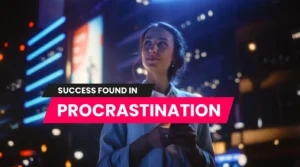In a world that praises efficiency and frowns upon dawdling, the idea of procrastination as a tool for creativity might seem almost heretical. Yet, what if the very act of procrastination we often berate ourselves for could be one of our greatest allies in unlocking creativity? This notion, as counterintuitive as it might appear, has roots deeper than mere conjecture; it’s backed by psychological insights and research.
The Phenomenon of Procrastination
Procrastination is typically viewed through a negative lens, associated with laziness or a lack of discipline. However, when we procrastinate, we’re not just avoiding tasks; we’re subconsciously engaging in a process that can broaden our thinking. Instead of confining ourselves to a narrow path of focus, procrastination allows our minds the liberty to wander, to embark on a mental expedition beyond conventional boundaries. This is not aimless wandering but a vital part of the creative process.
The Creative Process Unleashed
Consider the findings of a study where students were tasked with devising new business ideas for a vacant campus store. The group that dove straight into the problem tended towards predictable solutions, like proposing another convenience store. Conversely, students who engaged in procrastination, spending time on unrelated activities like playing Minesweeper or Solitaire, later came up with ideas significantly more creative, such as tutoring centers and storage facilities. Their concepts were judged to be 28% more innovative than those of the non-procrastinators.
This outcome highlights a crucial aspect of procrastination that we often overlook: the phase of incubation. During this phase, ideas are allowed to simmer, evolve, and intertwine in the subconscious mind, eventually emerging as more mature and inventive solutions. It’s a period where creativity is not forced but nurtured, allowing for a richer harvest of ideas.
Procrastination vs. Laziness
It’s important to distinguish procrastination from laziness. Laziness implies a lack of action out of disinterest, while procrastination can be a sign that our brains are seeking an alternative, more creative route to problem-solving. It’s a method of giving ourselves space to think differently and to approach problems from new angles.
Embracing Procrastination Creatively
To harness procrastination as a tool for creativity, it’s essential to engage in it mindfully. When you find yourself procrastinating, take a moment to consider what your brain might be trying to tell you. Is there a different perspective you haven’t considered? Could this time be used to broaden your thought process?
However, this doesn’t mean all forms of procrastination are beneficial. There’s a fine line between creatively productive procrastination and simply wasting time. The key is to use the period of procrastination as a deliberate strategy for creativity, allowing your ideas to incubate and mature.
A New Perspective on Procrastination
Next time you catch yourself in the act of procrastination, rather than succumbing to guilt, ask yourself if this might be an opportunity for creative exploration. Could this be a moment for your ideas to diversify and expand? By shifting our perspective on procrastination, we can transform it from a source of guilt into a creative advantage.
We’ve all experienced moments of eureka not while actively thinking about a problem but when our minds were seemingly elsewhere. These anecdotes support the notion that within procrastination lies a hidden potential for creativity.
So, the next time you find yourself procrastinating, remember, it might just be your brain’s way of seeking a more innovative solution. Let’s embrace this new understanding and turn procrastination into a strategic tool for enhancing our creativity and effectiveness.




